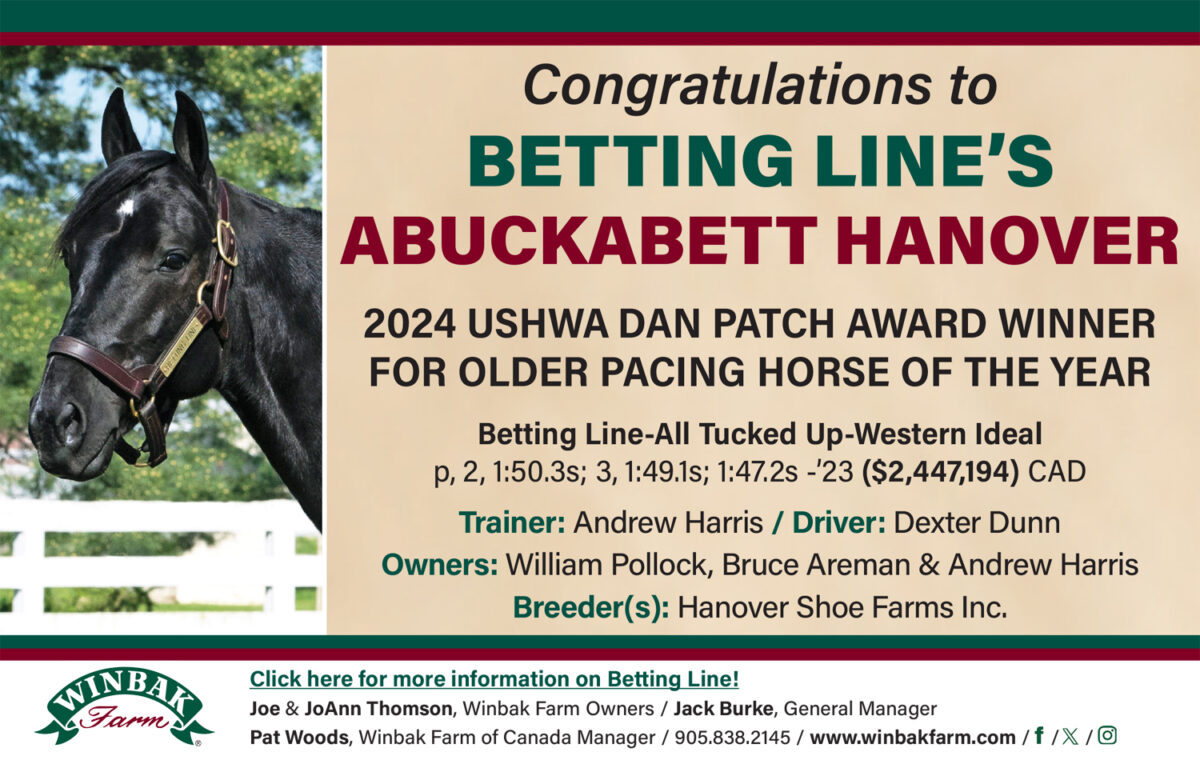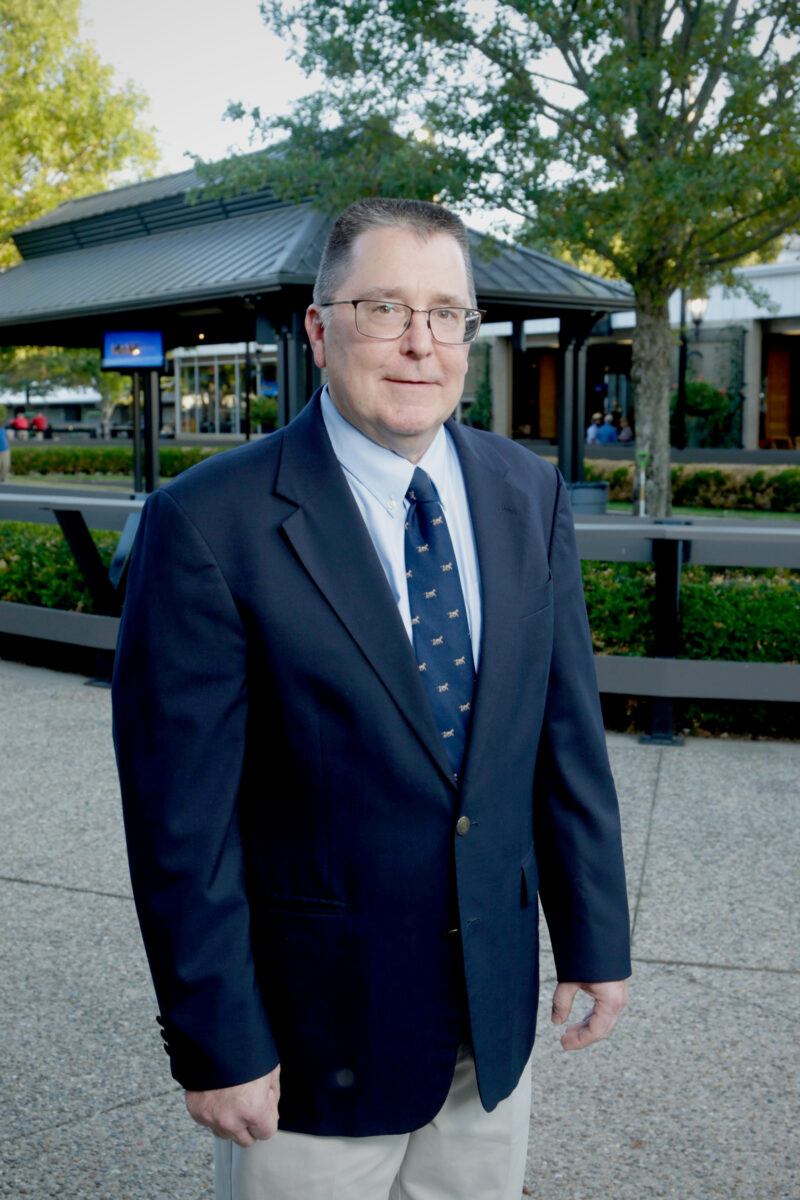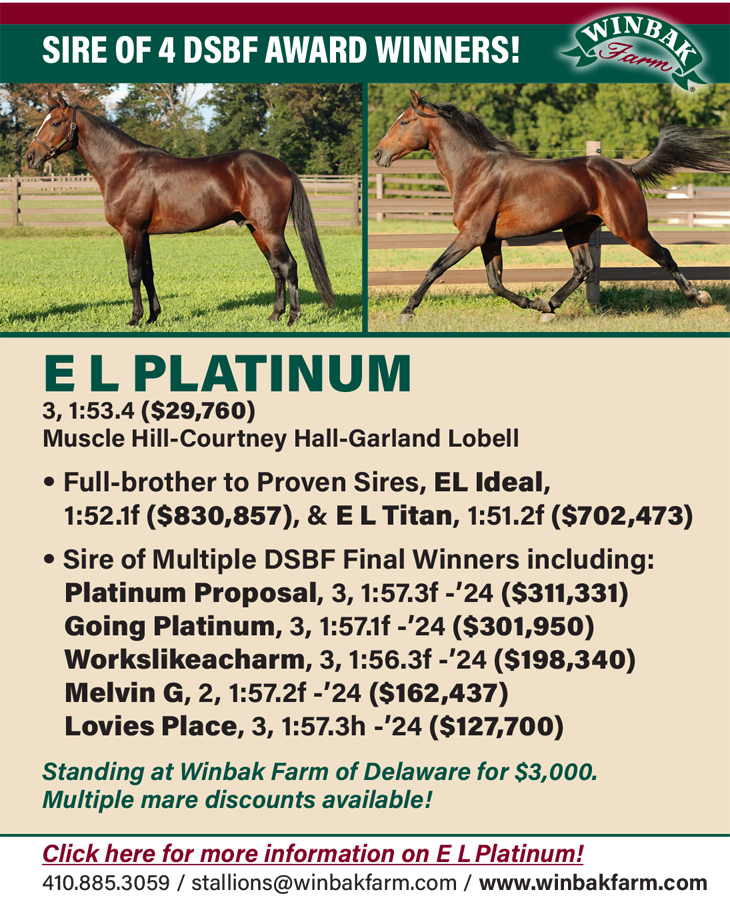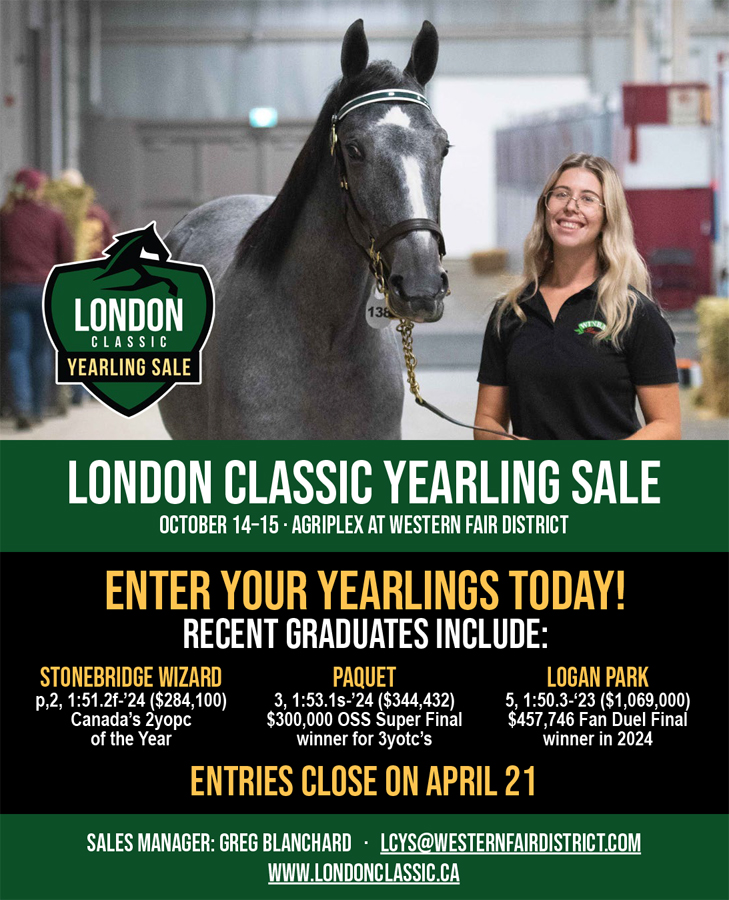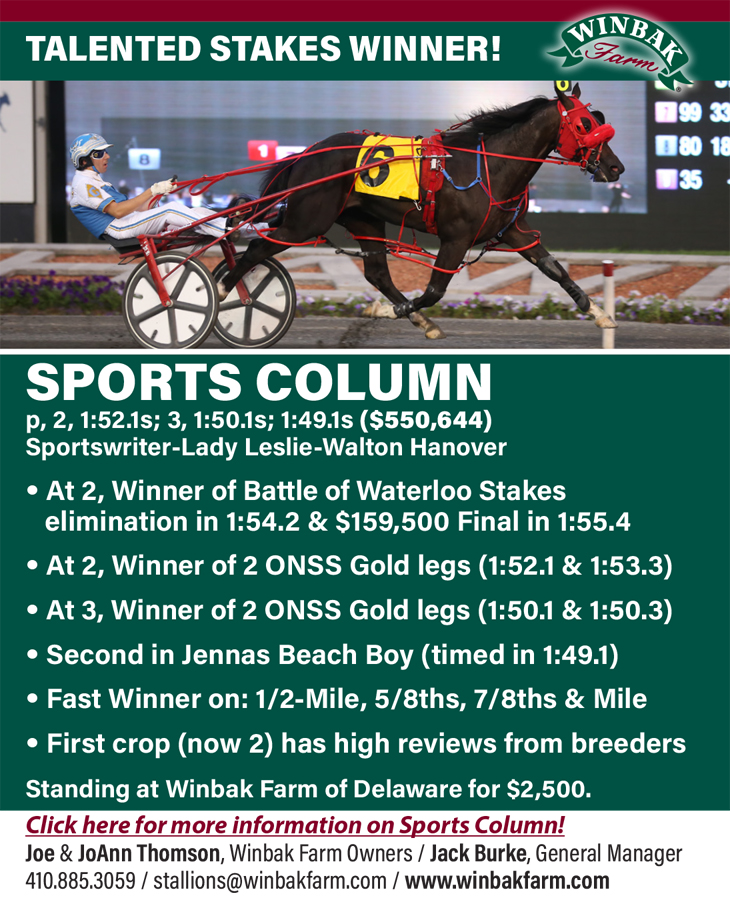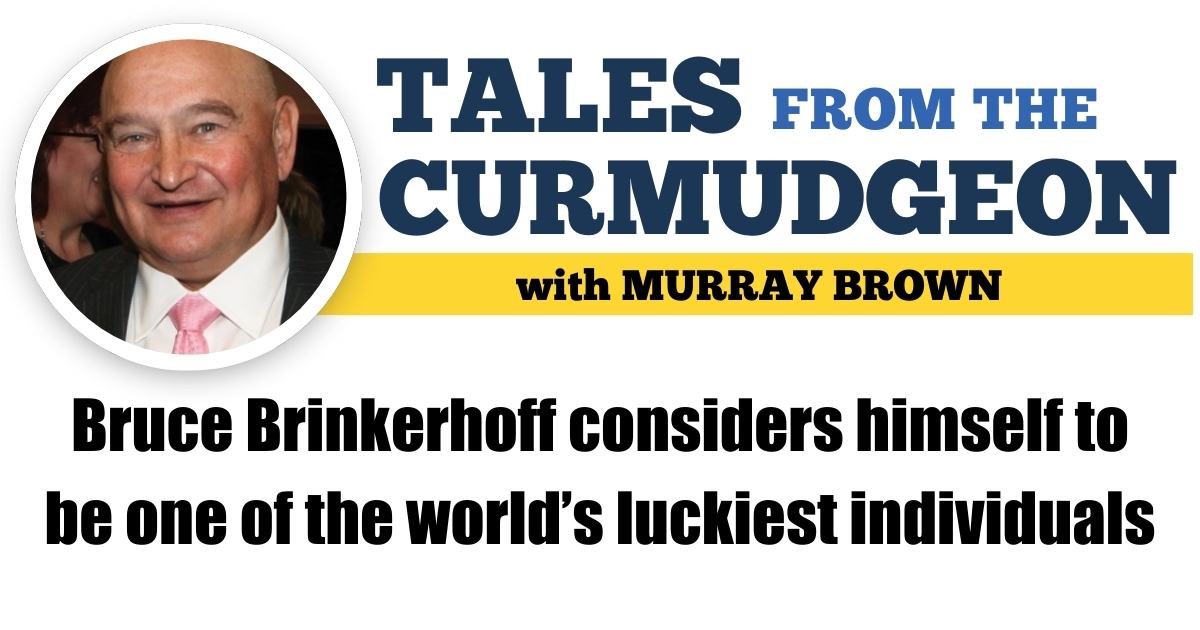
Bruce Brinkerhoff considers himself to be one of the world’s luckiest individuals
by Murray Brown
Bruce Brinkerhoff has no harness racing in his pedigree, but he comes from an area in Southern Illinois that has produced some of harness racing’s most renowned families — that of the Tetricks (Tim, Trace and Tom), the Grahams (Sonny and Jerry; Brinkerhoff’s dad was a schoolmate of Sonny), the Beckers (Carl and Kurt) and the Alagnas (Tony and mom Donna Lee).
He is the son of two school teachers. So, no association there. Actually, it was through thoroughbred racing, more specifically perhaps the greatest of all thoroughbreds, Secretariat, that Brinkerhoff began his lifelong pursuit in harness racing.
As a 10-year-old, he saw Secretariat win the Triple Crown. There were no significant thoroughbreds nor thoroughbred racing in Salem, IL, but there was harness racing; lots of it. So young Brinkerhoff took the closest path to horses. He began working as a groom, and eventually for the then very significant Sonny Graham Stable. His school teacher parents were not too keen on this lifepath decision. They felt it was of prime importance that he first get a good education and then follow any path in which life might lead him.
Brinkerhoff did attend and graduated from Ohio State’s ATI campus with a degree in Horse Production and Management. More important though, it was there that he met his wife Melissa who also graduated with a Horse Production and Management degree.
Through the years he has been involved for varying periods of time in just about every facet of horsedom including, but perhaps not limited to, breeding, training, driving (just a handful of races), farm management (including even at a thoroughbred farm), doing reference and pedigree work at the USTA and Kentucky Standardbred Horse Sale, all of them contributing to his present position as co-manager of the sport’s number one yearling sale the Lexington Selected Yearling Sale and also of its Ohio subsidiary the Ohio Selected Jug Yearling Sale.
Let’s take a timeline tour through your life in harness racing.
“It began in Southern Illinois, Salem to be exact, when I went to work at the county fairgrounds rubbing horses. It progressed to where I actually trained and drove a little on the Illinois Fair Circuit. I suppose that my first taste of the big time was when I took the 3-year-old pacing filly Final Act on the Grand Circuit road for Sonny Graham. She was a good filly, but not good enough to defeat the likes of Three Diamonds and Albaquel who were in her age group. She earned just a few dollars less than $280,000 which was pretty darn good back then.”
Then?
“I had gotten married. Life on the road was not the healthiest environment for a young newly-married person who was looking to start a family so we went to work for Kentuckiana Farms for a season with sale yearlings. From there we moved to Ohio and I ran a thoroughbred farm for a couple of years. I then received an offer to manage Bob O’Donnell’s Hobby Horse Farm in Ohio and I ran, not walked to grab it.”
What can you tell us about Hobby Horse Farm and Bob O’Donnell?
“I worked for Bob for three years until he sold the land and retired. If there is a number one place for a great breeder who history has not given its due, that spot should be reserved for Bob O’Donnell. With the possible exception of Bill Shehan, I do not believe there has ever been a small breeder who has had a greater impact on the sport than Bob. While Shehan is mostly remembered and given his due, O’Donnell and Hobby Horse have sadly been almost forgotten.
“O’Donnell was first and foremost a great student of pedigrees. Of all the people in the sport I’ve known, there are very few if any that have been as assiduous and well organized and as detail oriented as Bob. I received a great education studying under him. He had systems for just about everything. He had manuals for every function on the farm. To this day I follow some of the procedures I learned from him. As I speak with you, I am looking at a picture of perhaps my all-time favorite mare, Richelle Hanover, a representative of the prolific Miss Duvall family in which Bob O’Donnell was a great believer. Richelle Hanover was of course the dam of the great world champion filly Misty Raquel and the grandam, third, fourth and even fifth dam of numerous top racehorses and producers up to the present. (I believe Richelle Hanover deserves to be in the Hall of Fame).”
After Hobby Horse, you worked at the Meirs family’s Concord Stud in New Jersey. They were already standing Direct Scooter and just had acquired the great Niatross. Allow me to digress a bit and speak of the number one puzzle that has eluded me more than any other of my lifetime in the sport.
“You are certainly speaking of Niatross, the horse of who so much was expected in the stud. He not only met those expectations, but surpassed them — but only from his first two crops, especially the first one where he produced so many top-quality colts that perhaps the only thing that prevented him from having more champions was that they had to race against each other. Then with significantly larger crops, including many with foals from arguably better mares, he was never able to come even close to duplicating his previous success. I’m afraid I cannot help you. It’s a question that I’ve often asked myself to which I’ve never come close to coming up with an adequate answer — if indeed there is one.”
After working at Concord, you came back to Ohio.
“I had the opportunity to work at the USTA with David Carr in the Information and Research Dept. concentrating on pedigrees and statistics. It was work that I enjoyed and which intrigued me. We worked with pedigrees which led to the USTA computer generated ones of today. We also developed the Crosses of Gold. While at the USTA, the person who was doing the pedigrees for the Kentucky Standardbred Horse Sale left unexpectedly. Randy Manges, the sales’ manager, asked me if I would come to work for them doing pedigree work. I accepted the offer and also became part of the Sale’s yearling inspection team along with Randy and Bart Glass.”
You mention Randy and Bart as being among the individuals from which you have learned the most.
“Yes, Randy mostly because of the opportunities he gave me both at Kentucky Standardbred and at Ohio Selected Jug Sale. I tagged along with him. I learned by watching. I was able to help him do whatever he asked me to. Bart became like a second father to me. He knew more about livestock in general and horses and cattle in particular than anybody I have ever known. He was most generous with both his time and knowledge. Being on the road with him evaluating yearlings allowed for a great deal of time for me to ask questions and increase my knowledge. It was like being paid to go to school. Thankfully, he never tired of imparting his wealth of knowledge.”
You are now the co-manager , along with David Reid, of the Lexington Selected Yearling Sale. How did that come about?
“In 2023 Randy’s health had seriously declined. I was asked to be the co-manager and Randy assumed a position as a senior advisor. Sadly, Randy passed away last fall.”
What does it feel like to manage the world’s most successful standardbred yearling sale?
“Yes. I consider myself to be one of the world’s luckiest individuals. I work doing what I love. The position allows me to work with and be close to almost all of the world’s greatest horsepeople and their horses, both already established and many who have greatness in their destiny.”






